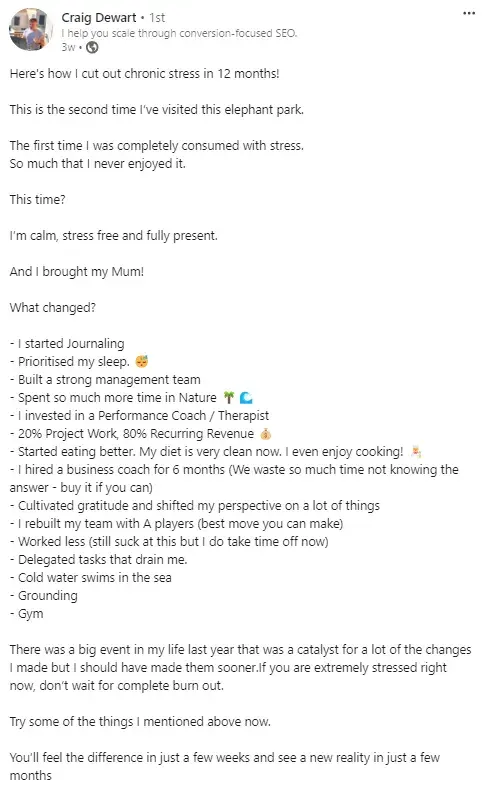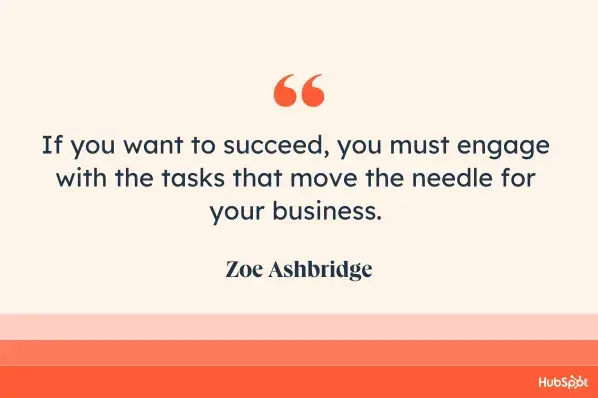Let’s talk about emotional resilience — that’s the ability to respond to stress, unpredictable outcomes, and setbacks. Why do I bring this up in the context of entrepreneurship? Sometimes, life just happens. No matter your niche, product, or service, and no matter how prepared you are, your business will throw you a curveball.

That simple fact makes emotional resilience a cardinal competency to master as an entrepreneur. I tell you this from experience.
As a marketing business owner whose revenue primarily comes from my writing services, late 2022 to mid-2023 was… unnerving, to say the least. Call me short-sighted, but I didn’t see the ChatGPT train a comin’ to the degree that it did.
Overnight (or at least that’s what it felt like), I suddenly wondered whether AI would wipe out my entire business. Fortunately, this wasn’t the case. In fact, I look back now and feel proud that, although I was scared, rather than become utterly demoralized, I flipped the script.
Instead of biting my nails to the bone over what AI could do, I positioned myself as a writer who could do what AI couldn’t. I positioned myself as a human writer with first-hand experience and the ability to relate to readers — like really relate to them, not in some synthetic AI cosplaying way.
That, right there, is emotional resilience in action. It was a difficult time, sure. But I rode the waves of stress; they didn’t pull me under. Here’s the real kicker: It’s not like I had a choice. Unlike other competencies, I couldn’t exactly ‘“outsource” this skill. I had to walk through the fire (while practicing self-compassion) and lean into my support network.
If this had happened even two years ago, it would’ve broken me — completely. After all, it’s not like we come out of the womb all centered and emotionally resilient. It’s an entrepreneurial competency we must develop first-hand. More on that later.
Table of Contents
- What is Entrepreneurial Competency?
- Competencies That Every Entrepreneur Needs
- How to Build Competency
What is Entrepreneurial Competency?
Entrepreneurial competency means having sufficient skills, knowledge, and personal traits to succeed. To gain competency, you first need to have — or learn to have — entrepreneurial competencies. Entrepreneurial competencies are professional skills, knowledge, and behaviors that impact your performance as an entrepreneur.
Need clarification on competency versus competencies? No worries. Let’s break it down further. You might achieve entrepreneurial competency through emotional resilience, self-awareness, or interpersonal skills. These skills are all entrepreneurial competencies.
Let’s take self-awareness as an example. This skill helps you understand your core strengths and weaknesses. Because of this understanding, you hire people with the specific competencies you lack. And that leads to a well-balanced team, which leads to organizational success. If your organization succeeds, you succeed. Voila! You have achieved entrepreneurial competency.
The real kicker? Your competency and competencies can also make or break broader organizational performance. A recent empirical study exploring the impact of entrepreneurial traits and their implications for enterprise success finds:
“Strong positive co-relations between traits and enterprise success. It establishes that successful and unsuccessful enterprises display distinct traits and significantly differ from each other. Entrepreneurial traits affect enterprise success, and the former has significant predictive value on the latter.”
A further study researching dominant characteristics for entrepreneurial intention and success finds that, “Characteristics that predict entrepreneurial intention also guarantee entrepreneurial success.”
Long story short? If you’re an entrepreneur or considering entrepreneurship, chances are you already have at least some competencies that typically correlate with entrepreneurial success. However, to know if you have these entrepreneurial competencies, you first need to know what they are.
Competencies That Every Entrepreneur Needs
I spoke with existing entrepreneurs about the competencies they identify necessary for entrepreneurial success. From CEO, to serial entrepreneur, co-founder, and more — here’s what they had to say.
Emotional Resilience
I spoke with Ali Q Naqvi, CEO of alif, a corporate coaching and HR solution company. Naqvi is also a Kolbe Certified Consultant, and I love his LinkedIn content about working to your intuitive strengths and weaknesses as a leader.
“I’d say the ability to deal with risk and uncertainty has to be right up there as an ‘emotional skill,’” says Naqvi. “This can be particularly jarring for those transitioning from a corporate career into entrepreneurship. I know, because I’m one of those people.”
He reminds us that while working on your own business and exploring new ideas can be exciting, the lack of structure and accountability for first-time entrepreneurs can be emotionally taxing.
Naqvi adds: “On any given day, you may feel like it’s all coming together, and you’re going to change your family’s life forever. Or you may feel like your idea isn’t all that special after all and could be replaced by AI next Thursday. I don’t think any entrepreneur is immune to the emotional toll taken by uncertainty and lack of security. That’s the good news.”
Naqvi asks us to think about successful entrepreneurs and how they’ve found effective ways of managing the stress of uncertainty — even if they can’t eliminate it altogether. That means emotional resilience is ultimately “a learnable skill.”

Emotional Resilience in Action (Example)
“I worked with an accountability coach when I first launched my business, and that really helped ‘make it real’ for me,” says Naqvi. “The sheer fact that there is somebody else out there who is going to hold you accountable for the actions you’ve committed to — that can be a powerful way to add structure to the chaos of entrepreneurship.”
Naqvi explains that entrepreneurs feel like they could work on a hundred different things on any given day. The emotionally resilient counterbalance to this scenario? “The practice of narrowing down the focus onto the 3-5 highest leverage actions that you can take that week — I found that to be a great ‘settler’ for my anxiety as a first-time entrepreneur.”
Naqvi reassures us that you can always go above and beyond your 3-5 weekly actions. In fact, given that entrepreneurs are “usually driven by nature,” it’s highly likely that you will. “But it’s nice to feel that regardless of whether or not you felt like you ‘had it’ that week, your business still moved forward because you worked on the highest-leverage things.”
Capacity for Learning
Now, we hand it over to Levi Reed, founding partner at Twig Ventures, an early-stage venture investing in sustainable consumer goods. Aside from this, Reed is a three-time former founder based in Seattle who works with dozens of early-stage founders as an accelerator director and entrepreneur in residence at Startup425.
“Capacity for learning is critical. The one thing a new founder can be certain of is that things are going to change,” says Reed. “They need to be adaptable and have the skills to acquire new skills. I like to reference the data point that the average successful startup has two major pivots before finding product/market fit.”
But what does this data point mean for entrepreneurs exactly? “This means that if you start a company, you can be pretty confident that the product that takes you to success (should you be lucky enough to find success) is going to be substantially different from your original idea.”
Capacity for Learning in Action (Example)
“One company I worked with built an all-in-one software platform for ecommerce sellers,” says Reed. “The idea was to make it easy to integrate international shipping and catalog management software in different regions … They struggled to find market fit unfortunately and nearly failed.”
Despite this near-failure, through external factors and a capacity for learning, the company found a new use case for the platform.
Reed adds: “While trying to sell the product, legislation was passed in their (large) home country mandating the unbundling of ecommerce services … This created substantial chaos as suddenly platforms designed to operate as closed ecosystems had to open up and still function.”
The integration functions of this startup’s platforms were adaptable to the use case. They ended up pivoting from international sellers to domestic sellers looking to build their own service stacks under the new legislation.
While the product didn’t change much, the market, use case, and value proposition completely shifted.

Self-Awareness
Another must-have entrepreneurial competency is self-awareness. That skill can lend itself to multiple areas of entrepreneurship. Three-time former founder Levi Reed shares two key examples of how you might apply self-awareness to your entrepreneurial journey.
First, Reed recommends being clear about your strengths and skills gaps. With that self-awareness, you can then “assemble a strong team.” Aside from smoother business operations, building a strong team matters if you’re looking for investors.
“As an investor, I know that a founder can’t have all the skills they need to build their business, so I want to see evidence that they can accurately identify the skills they need and who has them,” says Reed.
The second example of self-awareness (aka knowing yourself) in entrepreneurship is having a “genuine passion” for what you’re building. That means building something that truly excites you as a person.
“Founders often think that deep expertise in their field is the most important quality for them to possess,” Reed explains. “I like to point out that there’s nearly always someone with more expertise, accomplishments, accolades, etc. But the founder is the one here doing the work, not that other expert.”
Self-Awareness in Action (Example)
Craig Dewart, managing director of My Content Pal, recently shared a LinkedIn post that caught my eye. In the post, Dewart discusses the actions he took to reduce chronic stress. Part of that action involved the elements of self-awareness, which Reed highlights above.

For example, Dewart built a strong management team, hired a business coach for six months (“We waste so much time not knowing the answer—buy it if you can,” says Dewart in the post), rebuilt his team with A players, and delegated tasks that drained him.
People Management
You might start as a solopreneur — heck, you might be one now as you read this blog. But if you want to scale, at some point you will need to build a team. Building and overseeing a team comes with a new set of challenges. As such, Levi Reed cites people management as a much-needed entrepreneurial skill.
“Founders are often surprised by the need to be good managers,” says Reed. “But if you plan to start and scale a fast-growing company, the people management challenges are intense. Great founders have or acquire very strong people management skills, or they find others with those skills and get them onboard.”
People Management in Action (Example)
I was recently reading an article in Elite Business Magazine about entrepreneurship and people management. Will Rees, co-founder and director of Direct Online Services, was interviewed for the piece. Rees discusses how he prioritized people management while taking the business from a start-up to an over $18 million turnover company with 150 staff.
“You almost have to lead by example,” says Rees. “As long as you treat people with respect and show them that you are where you are because of your ability and how you have performed – rather than just being there for the sake of it – people will respect that, and they will value you as a leader rather than being envious.”
Digital agency founder Ben Towers, who was also featured in the article, adds:
“You can do all the research and read all the books about people management, but actually you just need to do it,” explains Towers. “Going out, doing it, learning from your mistakes and getting experience from it is a lot more beneficial than spending hours researching and reading about other people’s mistakes.”
Interpersonal Skills
Beyond people management, entrepreneurs typically need to have (or onboard someone with) interpersonal skills. But are they as necessary as other competencies? Levi Reed shares his take on this:
“Good people, sales, and communications skills are perhaps not always essential, but act as wildcard competencies that can compensate for a lot of deficiencies in other areas,” explains Reed.
“For example, a founder who lacks the knowledge to build what they want to create but has the ability to easily attract others to contribute their expertise can often still accomplish remarkable innovations.”
Reed reminds us that these remarkable innovations typically happen because of an entrepreneur's “ability to assemble a team rather than their own skills in the space, but nonetheless, they can build and innovate effectively.”
Interpersonal Skills in Action (Example)
Matt Janaway, CEO of Marketing Labs, recently announced a new scheme to encourage interpersonal skills throughout the organization.
“At Marketing Labs, I recognized the impact of interpersonal interactions on the overall productivity and morale of our team,” explains Janaway. “With this in mind, I introduced the Good Work Scheme, an initiative designed to foster a supportive, collaborative, and conducive atmosphere.”
The Good Work Scheme is grounded in six principles: kindness, teamwork, acts of kindness, acknowledgment of good work, mentorship, and empathy. Every member of the Marketing Labs team is encouraged to implement these principles in their daily work.
Janaway adds: “A positive company culture enhances the work environment and directly relates to the quality of services we offer to our clients.”

Here’s what I love about the Good Work Scheme: it’s a top-down recognition of just how important interpersonal skills are within a company. As you can see in the screenshot above, Janaway leads by example, using interpersonal skills like communication and collaboration when introducing the initiative to his team.
I especially love the line, “You might want to grab a cup of tea or coffee.” It’s a great way to immediately put people at ease and create a sense of psychological safety. In my humble opinion, encouraging psychological safety is one of the primary functions of using interpersonal skills in leadership roles.
Decision-Making Optimization
Levi Reed shares his fifth, final (and all too often overlooked) entrepreneurial competency with us below.
“Lastly, an underrated skill, in my opinion, is the ability to accurately evaluate decisions and outcomes and practice decision making optimization,” says Reed. “Most people tend to assess decisions based on their outcomes, but this is a mistake (as any poker player will tell you).”
If assessing decisions based on outcomes is a mistake, what should entrepreneurs do instead?
Reed advises that you evaluate decisions based on their inputs while acknowledging that outcomes are always uncertain. “In other words, a good decision (a reasonable choice given the available data that maximizes the chances of a positive outcome) can still yield a negative outcome.”
Reed adds: “However, changing one’s decision-making process in the future based on that outcome would be an error since the decision wasn’t at fault. It’s vital for a founder to understand the nuances of this reality and seek to continuously improve their ability to assess risk and evaluate their decisions for ongoing improvement.”
Decision-Making Optimization in Action (Example)
Earlier, Reed shared an example of entrepreneurs showing capacity for learning. I think his example also demonstrates decision-making optimization.
The founders behind the all-in-one software platform for ecommerce sellers narrowly avoided failure. In the first instance, they made a reasonable product choice, given the data they had. They hoped to maximize the chances of a positive outcome but couldn’t find a market fit. The outcome was “negative.”
Instead of blaming the decisions that led to the initial outcome, the founders used this learning to improve their ability to assess risk in the future. Then, when an opportunity arose (in this case, through legislation changes), they pivoted and found a product fit.
Organizational Skills
I’m blessed to know and work with Zoe Ashbridge, co-founder of search engine marketing agency forank. She is one of the hardest-working founders I know, and it’s been a pleasure to watch her business grow from strength to strength. (And do so during a challenging/changeable ecosystem for search.)
So when I had the opportunity to ask her about her must-have entrepreneurial competency, of course, I jumped at the chance. Fortunately for us, she was happy to share her insights.
“Organization skills are a must for entrepreneurs,” says Ashbridge. “Naturally, you will organize yourself first: your time and your priorities. As an entrepreneur, I know many things are begging for your attention. If you want to succeed, you must engage with the tasks that move the needle for your business.”
Like Ali Q Naqvi, Ashbridge recognizes the importance of prioritizing your highest-leverage actions or tasks, “I have to organize my time and my calendar to keep myself focused. Otherwise, I might gravitate toward tasks that excite me at the moment; this isn’t always a bad thing, though!”
According to Ashbridge, aside from organizing yourself, you’ll inevitably need to organize staff, their roles, business processes, and more if you're scaling a business and a team. So, the faster you can master your organizational skills, the better because “you’ll be well equipped when it’s time to scale.”
Organizational Skills in Action (Example)
“I’ve worked as a project manager for over nine years, and I credit that time with helping me become organized and manage a team,” explains Ashbridge.
“My business was months old when I started documenting processes. At the time, I couldn’t afford to pay someone to help with these tasks, but I knew that if I started building a database of processes now, they’d come in handy later — and you can bet they did!”
Ashbridge reminds us that as an entrepreneur, you need to get as much of your business out of your head and onto paper, adding: “With a database of processes ready, onboarding and training staff is easy. You’ll be able to outsource some of those niggling tasks so you can free your time to focus on the most critical actions.”

How to Build Competency
Now that we’ve identified seven competencies that can impact entrepreneurial success, it’s time to learn how to build them. Entrepreneurs Ali Q Naqvi, Levi Reed, and Zoe Ashbridge step back up to the plate and share their tips for building entrepreneurial competency.
Find Your “Mode of Operation”
Earlier, Ali Q Naqvi discussed emotional resilience, specifically, “the ability to deal with risk and uncertainty.” Now, Naqvi shares his advice for building this entrepreneurial competency.
“I may be biased as a Kolbe Certified Consultant, but I truly believe that taking a Kolbe A Index psychometric assessment is one of the best investments you can make in yourself as an entrepreneur. Why? Because it gives you a clear picture of your ‘mode of operation,’” says Naqvi.
Naqvi explains that your mode of operation is how you naturally process information, follow procedures, deal with risk and uncertainty, and communicate ideas. These instinctive strengths will never change, regardless of external circumstances. That’s more good news. Armed with this knowledge, you can craft your work life to play to your instinctive strengths.
Turn Your Monologue into a Dialogue
So what do you do if you’re feeling self-doubt, imposter syndrome, or struggling with the emotional toll of entrepreneurship? How can you further build your emotional resilience and weather risk?
“I like the idea of ‘turning the monologue into a dialogue,’ i.e., addressing those negative, self-limiting thoughts as an entrepreneur head-on,” says Naqvi. “This could be with a coach, a mentor, a business partner, a friend, or, in my case, with an AI chatbot.”
Be a Beginner … Intentionally
To recap, Levi Reed shared five entrepreneurial competencies:
- The capacity for learning.
- Self-awareness.
- People management.
- Interpersonal skills.
- Decision-making optimization.
Now, he shares three tips to help you build them.
“I think that by deliberately putting oneself in situations where you’re a novice at something … you can develop meaningful skills of adaptability and learn how to learn new skills. In other words, learning is in itself a learnable skill.”
Reed adds, “I like to see evidence of the curiosity that spurs founders to learn new things and the humility and tolerance of discomfort that enables them to be beginners at any stage in their career.”
Practice Lifelong Learning
Speaking of being a beginner on purpose, Reed explains that “a posture of lifelong learning goes a long way to developing and practicing the self-awareness and introspection necessary to honestly assess one’s own abilities and identify where you need help.”
Reed says this opinion always spurs people to ask him what kinds of things they should try out to practice lifelong learning. Well, Reed's response might surprise you: “My advice is to pick up the cello. You’ll never stop learning, and the sounds you produce along the way will inevitably keep you humble.”
Prioritize Healthy Emotional Perspectives
Naqvi and Reed both acknowledge that entrepreneurship is unpredictable by its very nature. Aside from building emotional resilience to weather such a changeable and often volatile landscape, Levi Reed recommends the following:
“I think it’s really vital to acknowledge that there’s an enormous amount of variables that are not under the entrepreneur’s control,” explains Reed.
“I encourage founders I work with to work on prioritizing healthy emotional perspectives, which includes acknowledging that while the company is their responsibility, not everything that happens is their fault.”
Invest in a Project Management Tool
Zoe Ashbridge highlights organizational skills as a fundamental competency for any entrepreneur. She shares her thoughts on developing and practicing organizational skills and two essential tools that help her organize herself and her team. The first is a project management tool.
“I like Asana and Click Up for teams and use Motion for myself, too,” says Ashbridge. “Your project management tool should hold everything related to project flows. If there are tasks or projects you create often, create a process flow.”
Ashbridge adds: “For example, I have content uploading processes that break everything into the most minor tasks so that anyone could do it without my input … With this level of granularity, you also hold your team accountable, and it keeps the standard up.”
Have a Database or Knowledge Base
A database or knowledge base is the second tool that Ashbridge recommends entrepreneurs create to develop their organizational skills.
“I like Google Apps for this, but Notion is great,” Ashbridge explains. “Your database holds all your guides and templates. For example, I’ve got a complete guide on alt text. My Asana task can link to the guide, so if a new team member needs more context, they can go and get it and learn about it independently.”
The Bottom Line on Developing Entrepreneurial Competency
Here’s the thing: You don’t need to possess every entrepreneurial competency listed here to be a successful entrepreneur. But at a minimum, you should hone your emotional resilience, capacity for learning, self-awareness, decision-making, and, at least in the early days, your organizational skills.
You can always outsource people management and, to some degree, interpersonal skills to people better at those skills than you are. Eventually, you might even be able to outsource organizational skills — if you can’t get organized, pay someone to organize your time.
But to develop or improve the “must-have” entrepreneurial competencies, find your mode of operation, prioritize healthy emotional perspectives, and invest in tools/infrastructure to support your organization.












